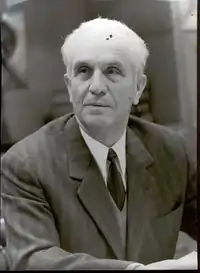Mihailo Apostolski
Mihajlo Apostolski (Macedonian: Михајло Апостолски; born Mihail Mitev Apostolov,[2] Bulgarian: Михаил Митев Апостолов;[3] Serbian: Михаило Митић or Mihailo Mitić;[4] November 8, 1906 – August 7, 1987) was a Yugoslav general, military theoretician, politician and historian. He was commander of the Headquarters of the National Liberation Army and Partisan detachments of Macedonia (NOV and POM),[1][5] colonel general of the Yugoslav National Army (JNA), and was declared a People's Hero of Yugoslavia.
Mihailo Apostolski | |
|---|---|
Михаило Апостолски | |
.JPG.webp) Mihailo Apostolski | |
| Born | November 8, 1906 |
| Died | August 7, 1987 (aged 80) |
| Nationality | Macedonian[1] |
| Citizenship | SFR Yugoslavia |
| Education | Military academy in Belgrade |
| Alma mater | Military Academy, Kingdom of Yugoslavia |
| Occupation | colonel general, politician, historian |
| Known for | Commander of the Headquarters of the People's Liberation Army and Partisan detachments in Macedonia during World War II.[1] |
Notable work | ASNOM |
| Title | Dr., PhD. |
| Term | President of the Macedonian Academy of Sciences and Arts (1976-1983) |
| Predecessor | Blaže Koneski (1967-1975) |
| Successor | Jordan Pop Jordanov (1984-1991) |
| Political party | Communist Party of Yugoslavia (since April 1942) |
| Spouse(s) | Cveta Apostolska |
| Parent(s) | Mite Apostolski and Vasa Apostolska |
Biography
Early life
Apostolski was born on November 8, 1906 at Štip, Kosovo Vilayet, in the Ottoman Empire.[1][5] He attended primary and secondary school in Štip. In 1927 graduated from the Military Academy in Belgrade, capital of Kingdom of Yugoslavia. In 1933 he graduated from the High Military Academy, and in 1938 graduated Commanding Academy as a major.
During World War II
During the invasion of Yugoslavia in April 1941, as a commander of the alpine units of the Royal Yugoslav Army, he participated in demolition of bridges in today Slovenia, in order to slow the progress of the German troops.[6] After the capitulation of Yugoslavia, Bulgarian troops entered Vardar Banovina and seized most of it. Meanwhile Apostolski was captured by the Italian army and was taken to the camp Vestone. Shortly after, his father, a Bulgarian army veteran, made a request to the Bulgarian Minister of War, insisting on the Bulgarian roots of his family, and it was granted soon after. Apostolski, was released with Bulgarian intervention by the Italian authorities.[7][8]
After his liberation from the prison, Apostolski filed an application for appointment in the Bulgarian army.[9] Because of his past, him was offered a captain's rank as a Bulgarian officer in Labour battalion, but he considered this unsatisfactory.[10] Meanwhile Apostolski entered the Sofia University, where he conducted underground work.[11] In April 1942 he became a member of the CPY, and in June of the same year he was appointed commander of the Headquarters of the Yugoslav partisan units of Macedonia. In May 1943 he was appointed Major General. During the Second Session of AVNOJ he was appointed to the Presidency of AVNOJ.[1] In addition to the Macedonian brigades operating under his command, in February 1944, he commanded the brigades from Kosovo and Southern Serbia.[1] He became a member of the Initiative Board for organization of ASNOM. He participated in the First Session of the ASNOM and was elected to its Presidency.[1]
After World War II
After the Second World War Apostolski became one of the military leaders of new SFRY. After the end of his active military service he began intensively to deal with history of the Macedonian nation. From 1965 to 1970 was head of the Institute of National History in Skopje. He was actively involved in formation of the Macedonian Academy of Sciences and Arts, of which he was member since its creation. He was president of Macedonian Academy of Sciences and Arts for the period 1976-1983.[1]
He was also member of:
Legacy

In 1995, the Military Academy in Republic of Macedonia was named "General Mihailo Apostolski".
References
- Blaze Risteski (editor), Macedonian Encyclopedia (vol. I), MANU, 2009, Skopje.
- ...He was born in Ottoman Empire in Bulgarian Exarhists family as Mihail Mitev Apostolov...: The Liberation struggles after the First World War, 1919-1944, Dobrin Michev, Macedonian Scientific Institute, Historical Institute (Bulgarian Academy of Sciences), 2003, ISBN 9548187612, p. 430.
- Bulgarian Archives State Agency, Personalities; № 8: Mihail Mitev Apostolov. "Archived copy". Archived from the original on 2016-03-03. Retrieved 2012-11-14.CS1 maint: archived copy as title (link)
- Бјелајац, Миле; Трифуновић, Предраг (1997). Између војске и политике. Београд, Крушевац: Институт за новију историју Србије, Народни музеј Крушевац. ISBN 86-7005-020-X.CS1 maint: ref=harv (link)
- Narodni heroji Jugoslavije, Mladost, Beograd 1975.
- Kiro Gligorov, Macedonia is Everything we Have, Izdavacki centar TRI, 2001, Skopje (in Macedonian) Киро Глигоров, Македонија е сè што имаме, Издавачки центар ТРИ, 2001, Скопје
- Dimitar Bechev, Historical Dictionary of the Republic of Macedonia, Volume 68 of Historical Dictionaries of Europe, Scarecrow Press, 2009, ISBN 0810862956, p. 16.
- Dimitre Minchev (Military Publishing House, Sofia, 2002) Bulgarian Camagne Committees in Macedonia - 1941, Shtip, July 23, 1941, Document № 41.
- Македонски научен институт, 13 юли, 2016 г. Михайло Апостолски иска да стане български чиновник.
- Contested Ethnic Identity: The Case of Macedonian Immigrants in Toronto, 1900-1996, Chris Kostov, Peter Lang, 2010, p. 13., ISBN 3-0343-0196-0
- Dimitris Livanios, The Macedonian Question: Britain and the Southern Balkans 1939-1949, OUP Oxford, 2008, ISBN 0191528722, p. 122.